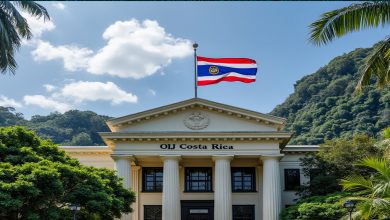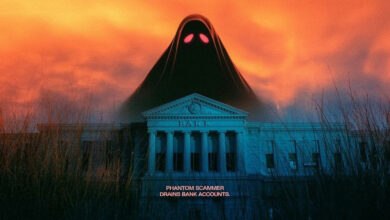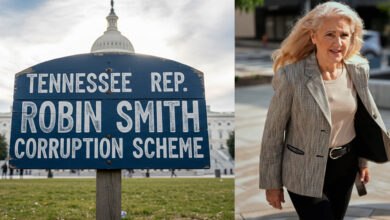A Corruption Nexus Exposed: U.S. Investor’s Quest for Justice in Costa Rica
Haga clic aquí para la versión en español.
It all starts with a formal criminal complaint. But this is no ordinary case—this is a tale of power, corruption, and survival, stretching from the sun-soaked streets of Costa Rica to the dark corridors of public offices, where the lines between law and lawlessness blur.
The complaint, filed on September 6, 2024, is addressed to some of Costa Rica’s highest officials—Costa Rica President Rodrigo Chavez, President Francisco Eiter Cruz Marchena of the Attorney Bar Association College of Attorneys, OIJ Director Randall Zúñiga, and the U.S. Embassy’s Cynthia A. Telles. It is a desperate cry for justice from one man, Enzo Vincenzi, an American businessman and real estate investor who claims to have been ensnared in a conspiracy that has cost him his hotel business, his home, and his peace of mind. But this is more than just a business dispute—this is a noir drama of betrayal, extortion, and, ultimately, survival in a place where justice feels bought and sold.
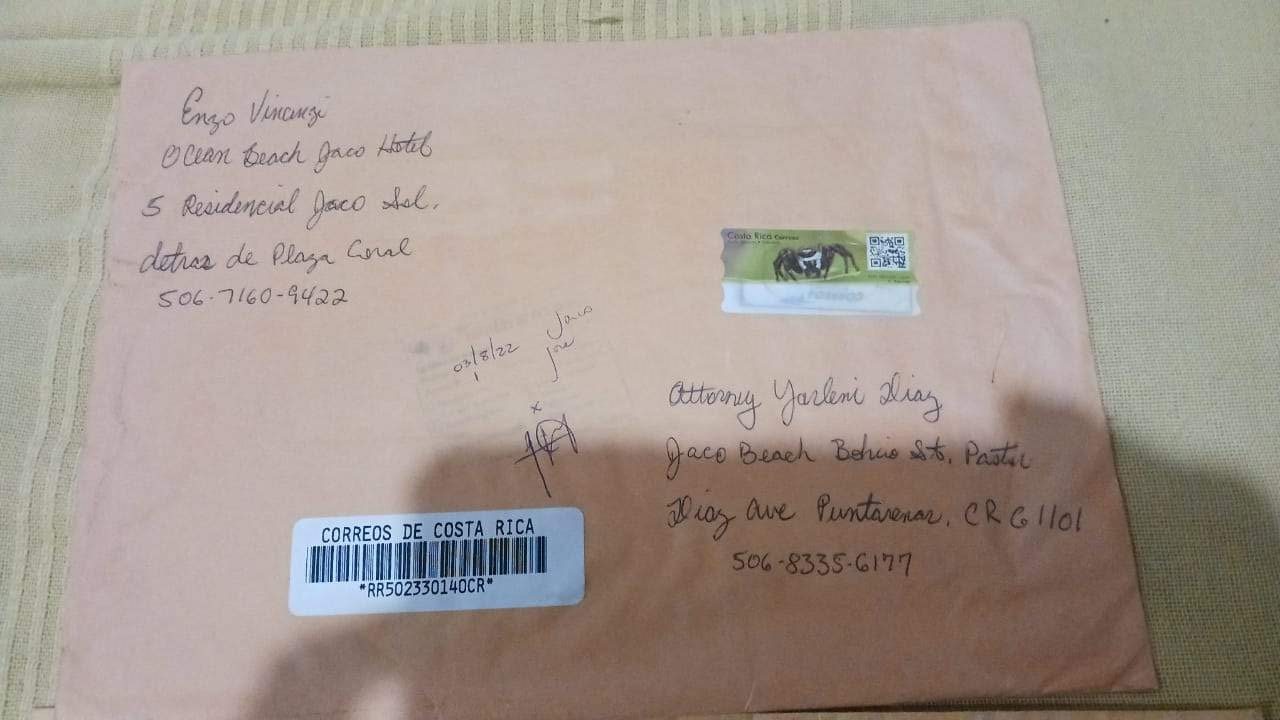
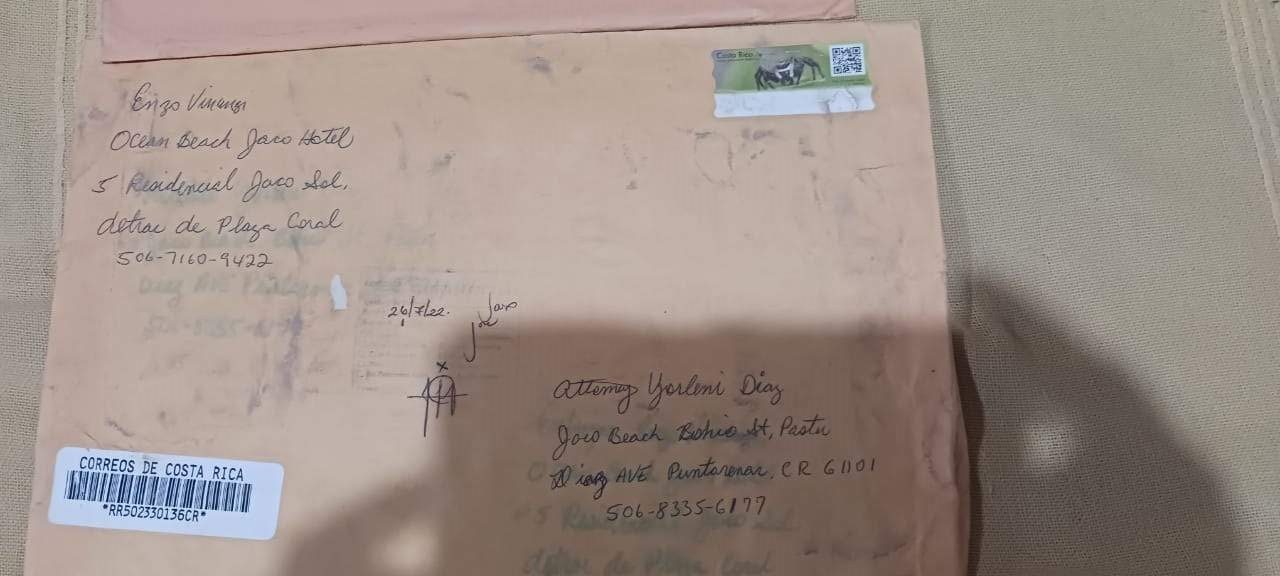
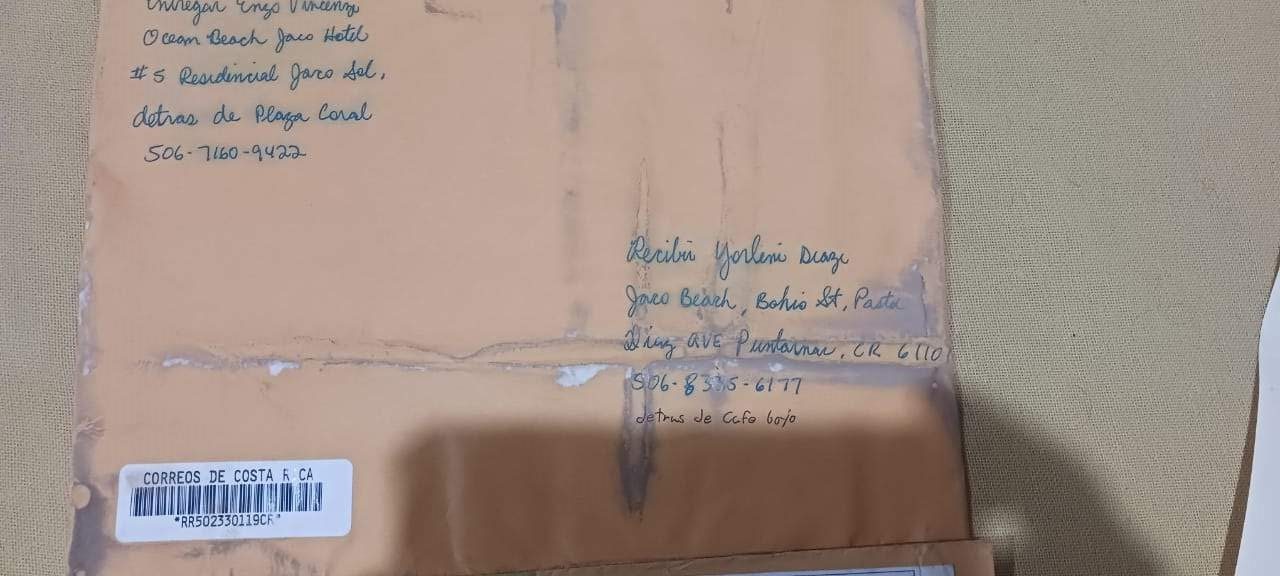
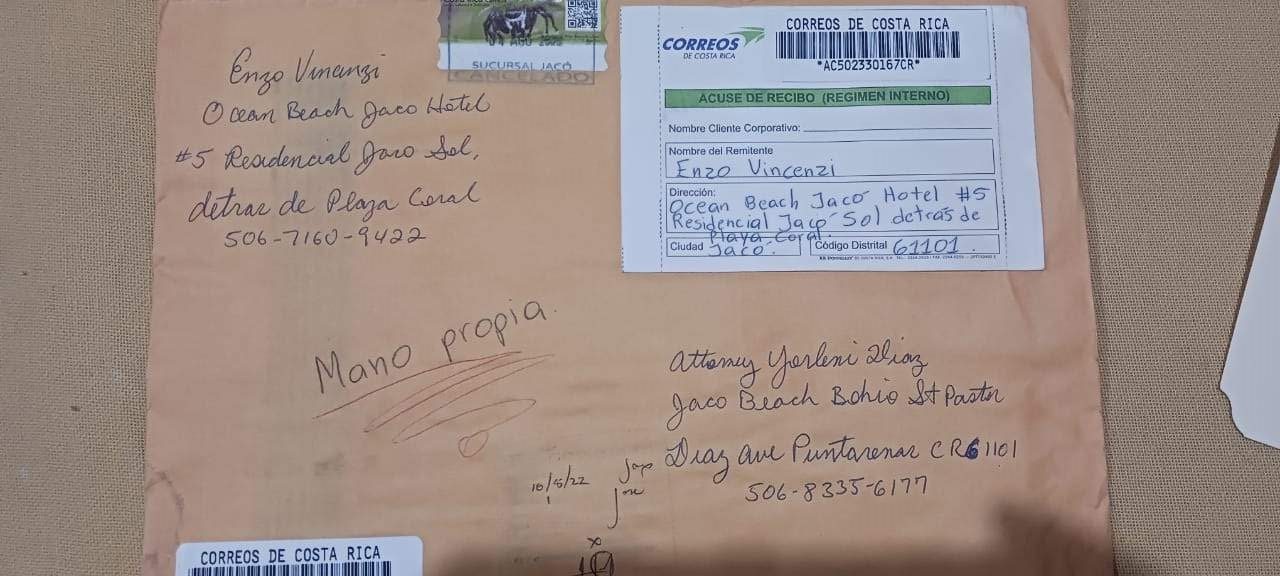
The complaint reads like a thriller, naming corrupt attorneys, officials, and even a judge. Vincenzi’s list of enemies is long: lawyers like Cristian Eduardo Zamora Sequeira, Yorleni Díaz, and Andrea Díaz; government figures such as the Mayor of Jacó, Tobias Murillo, and a Fiscal Attorney, Carlos Villegas Méndez. All accused of running a network of fraud, obstruction, and intimidation, built to swindle investors out of their properties.
At the heart of the accusations is a tale of fraudulent schemes, where fabricated charges, including false domestic violence claims, are the weapons of choice. These fake accusations have left Vincenzi on the brink of forced exile from Costa Rica. And while President Rodrigo Chaves himself has issued directives in the case, they have been ignored or openly mocked by local authorities—authorities who, Vincenzi asserts, are part of the very corruption he is battling.







His allegations are chilling. Vincenzi accuses lawyers of malpractice and theft, even claiming $35,000 was siphoned from his U.S. Wells Fargo account. A rogue law firm, ZAR Abogados, allegedly orchestrated the theft, with attorney Cristian Eduardo Zamora Sequeira unlawfully signing and endorsing checks. This is not merely a businessman’s lament; this is a tale where high-level corruption intertwines with criminal activity—an underworld hidden behind the respectability of Costa Rica’s legal system.

Then comes the darker twist—death threats. According to Vincenzi, these threats aren’t idle; they are part of a coordinated effort to scare him into silence, to push him out of Costa Rica and leave his properties and investments up for grabs. From a government lawyer, Norma Cayaso, to private figures like Myra Cecilia Villalobos Chacón, the threats are many, varied, and terrifying.

Villalobos, for instance, refused to leave Vincenzi’s property despite being legally evicted. Instead, she trespassed with local media in tow, launching public slander campaigns against his hotel business. More than just words, she threatened his life, in plain sight of witnesses, sending a clear message—back down, or face the consequences.
The more Vincenzi dug into the labyrinth, the deeper the rot seemed to run. Junior and Yorleni Díaz, a pair of lawyers, allegedly stole from him, practicing law under false pretenses while pocketing his money. José Calderon, another attorney, threatened to have Vincenzi killed unless he paid him off. Each figure in this sordid tale seemed more dangerous than the last, their crimes escalating in severity—from theft and fraud to murder plots designed to snuff out anyone standing in their way.

Adding to the tension is the role of corrupt judicial figures. Judge David Ricardo Madrigal, according to Vincenzi, is implicated in obstructing justice, purposefully leaving false charges open in public records to expose him to further legal jeopardy. Meanwhile, attempts to close cases with the police were met with deception—each time Vincenzi was assured his case was dismissed, he’d return days later to find it still very much alive.
As Vincenzi tries to unravel the conspiracy tightening around him, his list of enemies grows. It’s not just lawyers and judges; even Carly and James Huba, figures tied to the real estate scene, have made death threats, allegedly in front of hotel staff.

The scope of the corruption Vincenzi is up against is staggering, but perhaps most damning is the systemic rot in the very institutions meant to protect him. Government attorney Norma Cayaso, tasked with upholding the law, instead becomes a villain in his story. Vincenzi accuses her of dereliction, human rights abuses, and conspiracy with Yamileth De Los Angeles Araya Lara “Mila” to file more false charges. In a move ripped straight from the pages of a noir novel, the same dirty tactics used by Villalobos are recycled against him—fabricated accusations, public defamation, and an unwavering mission to drive him out.

Vincenzi’s ordeal began with a fraudulent lien placed on his home in Puntarenas province, orchestrated by a network of corrupt attorneys led by Cristian Eduardo Zamora Sequeira, José Juan Sánchez Chavarria, and others. The lien, a fabricated claim of $12,587 for a property tax already paid by a deceased prior owner, was almost successful in seizing his property. Vincenzi had no choice but to wire the extorted amount to prevent losing his home. But this was only the beginning of a far-reaching scheme aimed at expelling him from Costa Rica, seizing his hotel business, and stripping him of his assets.

The criminal actors involved were not merely rogue attorneys but figures embedded in the very fabric of the Costa Rican judicial system. Government attorney Norma Cayaso stands accused of orchestrating much of the obstruction of justice, working alongside other key officials like Fiscalia de Garabito attorney Eduardo Mora Casconte and a local translator, Glynne Dapane Rochester. Together, they allegedly conspired to silence Vincenzi, advising him to suppress evidence, including fraudulent domestic violence charges leveled against him by a woman named Yamileth De Los Angeles Araya Lara, known as “Mila.”

The attempted silencing of Vincenzi was not merely through legal manipulation. According to his testimony, Cayaso and her associates also worked with Mila to sabotage his hotel’s surveillance system, erase vital records, and access his bank accounts, nearly draining his U.S. funds before Wells Fargo’s fraud division intervened. Meanwhile, death threats against Vincenzi continued to escalate, a chilling reminder that the forces arrayed against him would stop at nothing to take his life and livelihood.
Vincenzi’s criminal complaint accuses this shadowy coalition of attorneys, police officials, and private actors of running a large-scale real estate and immigration scam targeting unsuspecting foreign investors. The alleged scheme is straightforward: lure foreign investors with the false promise, fees, and payments to become eligible for Costa Rican residency, fleece them with excessive fees and fabricated legal issues, and then entrap them in the court system with false charges, expelling them from the country to steal their assets. Vincenzi, a victim of this scheme, has already retained nine attorneys in a desperate bid to secure his residency—an elusive goal due to continuous legal obstructions. Precision Immigration is named in the filing.
Precision Immigration had a “conflict of interest” with corrupt public attorney Yorleni Diaz, according to a voicemail left for Enzo Vincenzi by Craig Anthony Atherton.
Woven into this criminal conspiracy is the involvement of international players like Carly and James Huba, two American citizens who, according to Vincenzi, actively engaged in slandering his reputation online. Their public defamatory statements on various platforms aimed to undermine his hotel business and discredit him in the eyes of potential investors, further isolating him in a hostile environment.
This sordid tale, riddled with corruption, human rights violations, and criminal collusion, sheds light on a deeper, more sinister problem within Costa Rica’s legal and political systems. As Vincenzi fights for justice, the criminal network, emboldened by years of impunity, seeks to silence him for good.
The remaining pages of his complaint promise even more revelations, implicating additional players in this conspiracy, each move meticulously designed to strip him of everything he has worked for, leaving a trail of destroyed lives and shattered trust in Costa Rica’s judicial system. The question now is whether Vincenzi’s relentless pursuit of justice will expose this criminal racket or if he, like so many before him, will become another victim swallowed by the system.
In a gripping tale of systemic corruption, human rights violations, and obstruction of justice, U.S. investor Enzo Vincenzi lays out his final stand against entrenched legal misconduct in Costa Rica. With a meticulous 13-page criminal complaint now filed, Vincenzi warns that should the Costa Rican Bar Association and law enforcement agencies fail to act within three days, the full force of U.S. governmental bodies will intervene.
Vincenzi’s allegations are not only personal but reflect a broader pattern of corruption within Costa Rican public institutions. He recounts the fraudulent mismanagement of a $35,000 check tied to a mortgage deal, already paid off via insurance upon the death of the seller, Rosibel Zamora Sequiera. Alongside documented court records from the Costa Rican Supreme Court and Jaco Court, the dossier also contains evidence implicating key legal figures in widespread corruption—an organized racket that has preyed on U.S. and foreign investors for years.
The stakes are high, and Vincenzi’s resolve is firm. His complaint is accompanied by threats of escalating the matter to the U.S. Department of State, FBI, Federal Trade Commission, and U.S. Immigration Department. He also demands a ban on the entry of those involved in these legal and human rights abuses into the United States. “The bar association’s inaction will lead to a federal lawsuit, holding all responsible parties accountable in U.S. courts,” the complaint warns.
In vivid detail, Vincenzi documents a web of conspiracies aimed at obstructing justice, issuing death threats, and orchestrating a murder plot. His warning is clear: if the Bar Association or implicated officials continue to obstruct justice, legal actions and federal investigations will commence. The crescendo of accusations climaxes in the final pages of the document, with Vincenzi issuing a stark public warning:
“This evil, demonic, organized racket has operated unchecked for years, preying on unsuspecting U.S., Canadian, Mexican, and U.K. investors. Unlike others who have been victimized, I refuse to back down.”
The evidence Vincenzi presents points to malicious misconduct at every level. From corrupt attorneys and public officials to false charges and police involvement in death threats, the complaint reads like a noir detective thriller, only this time the crime scene is real, and the stakes are life and death.
Enzo Vincenzi’s relentless pursuit of justice serves as both a damning indictment of Costa Rica’s legal system and a call to action for U.S. authorities to intervene. The clock is ticking. If action isn’t taken within days, Vincenzi’s next move could bring the weight of international law crashing down on those who thought themselves untouchable.
The final warning: “Govern yourselves accordingly—this is only the beginning.”
Enzo Vincenzi – Organized crime conspiracy criminal complaint Download:
https://theaegisalliance.com/wp-content/uploads/Downloads/9-07-2024-enzo-vincenzi-criminal-complaint.zip
